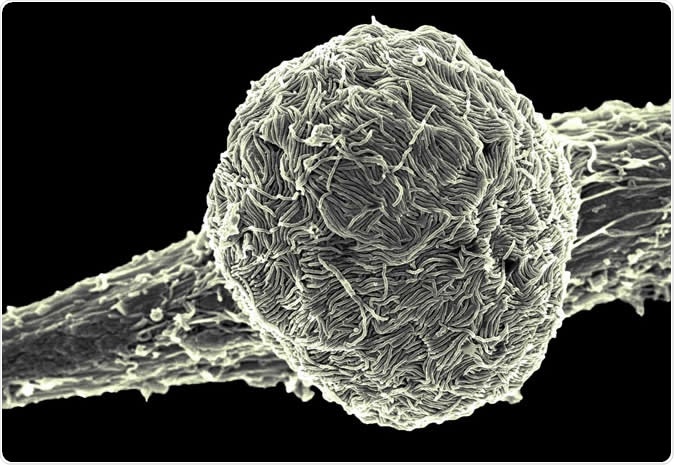The Ebola virus (EBOV), variant Makona, was the causative agent of the 2014-2016 West African epidemic that took over 11,000 lives and infected nearly 30,000 people. But with the combination of globally-supported containment efforts, health experts were able to track the spread of the outbreak, as well as use precautionary and quarantine procedures.
Now, many health experts are formulating effective Ebola vaccines to curb the spread of the virus and prevent another major outbreak. During the peak of the outbreak, scientists exerted efforts to develop several experimental vaccines, including the vesicular stomatitis virus (VSV)-based vaccine called the VSV-EBOV.

Ebola virus Makona covering the surface of an infected cell. Image Credit: NIAID
The vaccine has shown promise as effective against the virus in phase 3 clinical trial in Guinea. Today, the vaccine is being used during the ongoing outbreak in the Demographic Republic of Congo (DRC).
Now, a team of researchers at the National Institute of Allergy and Infectious Diseases (NIAID) and the National Institute of Health (NIH) Rocky Mountain Laboratories (RML) found that a single dose of a highly-diluted VSV-Ebola virus (EBOV) vaccine, which is about one-millionth of what’s inside the vaccine being used in the current outbreak, persists to be protective against the illness.
Even the smallest dose is effective against Ebola
The team of researchers tested many dosage strengths of the vaccine, including one dose with just 10 million-plaque forming units (PFU), and found that even with the smallest concentration, the vaccine was still fully protected against the Ebola virus.
The tested the vaccines on monkeys about 28 days before they got infected with a lethal dose of EBOV. The team studied and monitored the monkeys for 42 days after being infected. Surprisingly, even with the monkeys injected with the lowest dose of the vaccine appeared to be fully protected.
The study shows promise of controlling the spread of the virus and protecting people in the areas prone to Ebola outbreaks. Now, nearly 250,000 people have received the VSV-EBOV vaccine since August 2018.
“Our study provides missing pre-clinical data supporting the use of reduced VSV-EBOV vaccine doses without decreasing protective efficacy and at the same time increase vaccine safety and availability - two critical concerns in public health response,” the researchers wrote in the paper.
Ebola: deadly and highly-contagious
During the 2014-2016 outbreak, the major problem that has led to the massive spread of the virus was the lack of health services in West Africa. What more, most of the patients had symptoms like flu, letting them delay seeking medical attention not until their condition worsened.
The present outbreak in the nation is less severe since health agencies already know what to do, and a vaccine is now available for residents. With all efforts combined, it may become easier to control the current outbreak.
“While the current outbreak seems to have been quelled and the vaccine trials look hopeful, it would be in the best interest of the international medical and public health community to consider the handling of future outbreaks regarding the one that Africa has just experienced. What the global community has learned about ethics and culture, and obligations for care, let alone the controversies over vaccine trials, are of primary importance,” they added.
The Ebola virus outbreak
The Ebola virus has been present in the past four decades, but it was not until the 2014-2016 outbreak that it gained international attention. The rapid spread of the virus and the soaring death toll has raised the alarm, warranting health agencies across the globe to help in the surveillance and treatment of the infection.
But, despite the help coming from other parts of the world, the virus has already spread in West Africa and even health care workers are being infected. The development of a vaccine is the only chance to prevent infection and, eventually, curb the spread of the virus.
The new vaccine can help reduce fatalities linked to Ebola virus disease during outbreaks, and at the same time, protect healthcare workers who serve as first liners during these events.
The study was published in the journal EBioMedicine by The Lancet.
Journal reference:
Marzi, Andrea, Reynods, P., Mercado-Hernandez, R., Callison, J., Feldmann, F., Rosenke, R., Thomas, T., Scott, D., Hanley, P., Haddock, E., and Feldmann, H. (2019). Single low-dose VSV-EBOV vaccination protects cynomolgus macaques from lethal Ebola challenge. EBioMedicine by The Lancet. https://www.ebiomedicine.com/article/S2352-3964(19)30651-6/fulltext